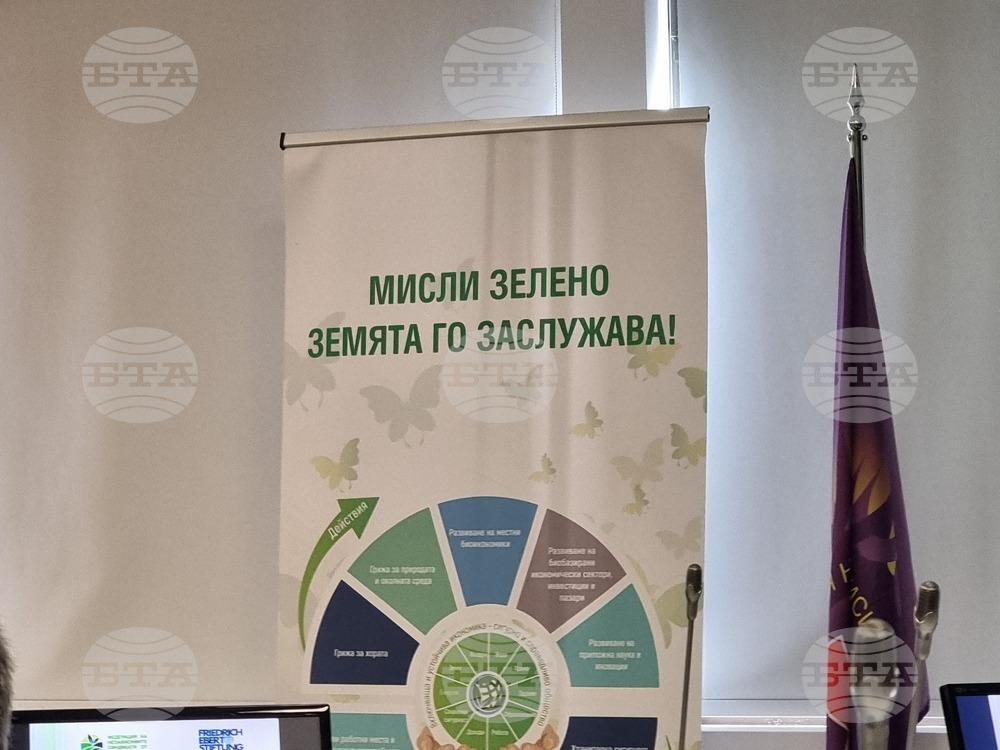site.btaSofia Forum Looks at How Green Transition Can Be Fair for Farmers


How to make the Green Transition fair for those working in the agricultural sector, while protecting natural resources from the risks of climate change were some of the highlights of a joint discussion organized by the Federation of Independent Trade Unions in Agriculture (FITU) at the Confederation of Independent Trade Unions in Bulgaria (CITU) and the Friedrich Ebert Foundation. The forum took place at CITUB headquarters in Sofia on Tuesday.
“Agriculture is a fundamental industry, which is linked to natural resources and we should be fully aware of what we have,” FITU leader Valentina Vassilyonova at the beginning of the forum. Agriculture is the sector that keeps regions alive and enables people to stay, she noted.
Kalina Drenska from the Friedrich Ebert Foundation said that this event is an appeal to the responsible institutions to get involved in the issue because, climate change is not waiting to see who will be prime minister.
Already with the announcement of the European Green Deal we were presented with the Farm to Fork Strategy with more than 25 initiatives to be implemented, as well as the biodiversity strategy until 2030, said CITUB deputy leader Ognian Atanassov. The Common Agricultural Policy had to be to some extent subordinated to tackling climate change, he recalled. CITUB insisted that a national plan for a fair transition be drawn up, where all the initiatives in the different sectors are looked at in total and the challenges are identified, so that someone can say, for example, how a 50% reduction in the use of pesticides and a 20% reduction in the use of fertilizers will affect productivity and employment, Atanassov said. “Not only in Bulgaria, but also in Europe, the agricultural sector has been the first to react to all these things that have tried to be imposed on us through the European Green Deal,” he said. He called for higher wages for agricultural workers.
Food security, tackling serious environmental issues including climate change, the need for sustainable food systems and short supply chains are some of the challenges associated with climate change, said Agricultural Academy Chair Prof. Violeta Bozhanova. The Green Transition is not just about politics and "getting environmentally minded people together to make policies", she believes. Green transition is inevitable because so many problems have accumulated and it is a possible alternative, Bozhanova added. Among those mentioned by Prof. Bozhanova were also problems with increased soil erosion, increase in pests and diseases, and reduced effectiveness of pesticides.
Hence the desire to reduce pesticide use by 50%, this is not just an abstract idea, the expert said. Violeta Bozhanova noted that in Eastern Bulgaria the consequences of climate change will be more serious than in other parts of the country. In her words, this was seen in 2020, when the percentage of yield reduction in Dobrudzha was about 60% compared to the yields of the previous five-year period. In these extreme years, Bulgarian varieties, which are well adapted to regional conditions, showed much higher yields than foreign ones, Bozhanova also said.
Prof. Ekaterina Bachvarova from the Bulgarian Academy of Sciences gave a presentation on the adaptation of the agricultural sector to the changing climate. If current emissions are maintained, a significant warming and drought in July is generally expected in our country. If emissions are reduced, there will be more moderate warming without drought, the data show. In the case of drastic emission reductions, warming will be without drought. The presentation pointed out that the range of temperature differences in Bulgaria is narrowing. There is some regrouping, a different redistribution, of the hottest areas. It can be seen that the Thracian lowland is actually the most affected by the rise in temperatures, commented Prof. Bachvarova. If emissions are not reduced, temperatures will be about five degrees higher by 2051 compared to 2021, according to the models on which the climate change impact projections are based. Under the other scenario, if emissions are reduced, the difference would be 1.5 degrees compared to 2021, Prof. Bachvarova said. In her words, if emissions are reduced, there will be more precipitation.
Deputy Minister of Agriculture and Food Ivan Kapitanov assured the participants that the Ministry is working to have predictability for the agricultural sector in relation to climate change.
/PP/
news.modal.header
news.modal.text